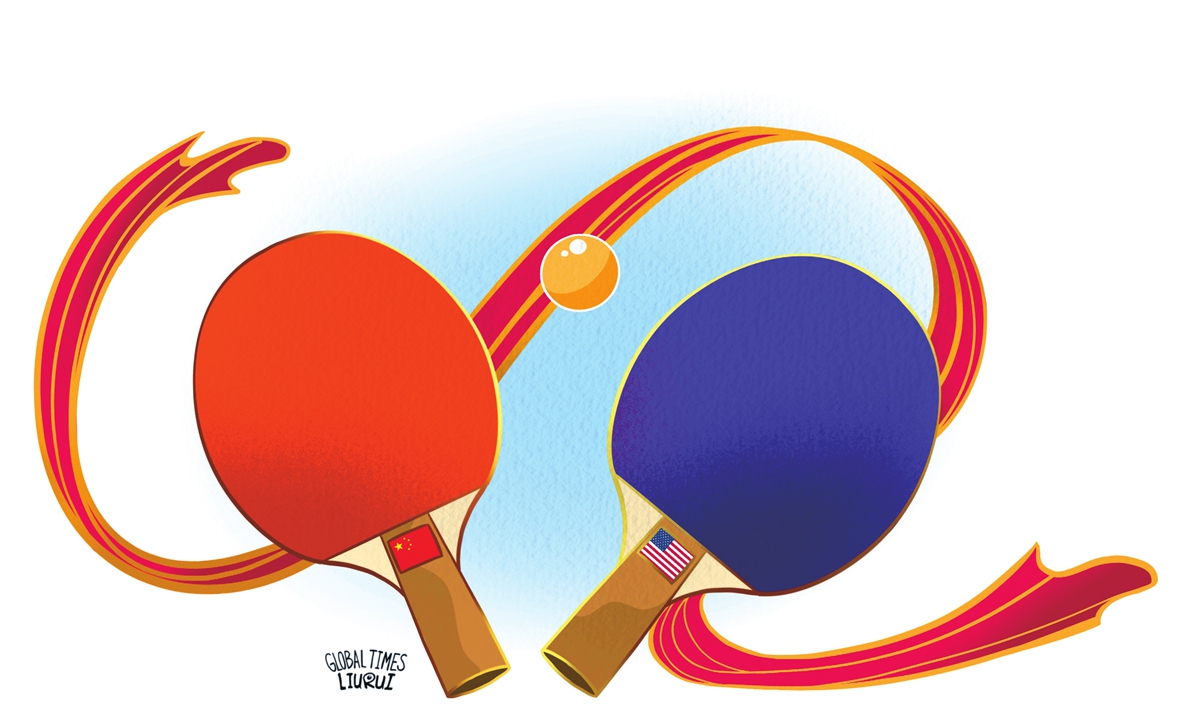
Illustration: Liu Rui/GT
The 45th anniversary of the establishment of diplomatic relations between China and the US was commemorated with a gesture that recalled an era of unexpected thawing in China-US relations: the exchange of table tennis teams between the University of Virginia and Peking University.This exchange, mirroring the historic "Ping-Pong Diplomacy" of the early 1970s, serves as a reminder of the unique role that sport, particularly table tennis, has played in bridging the divide between two of the world's major powers.
The original "Ping-Pong Diplomacy" was an event that marked the end of a 22-year estrangement between China and the US. Historical analysis shows that its emergence and subsequent evolution were promoted by many individuals who demonstrated ability, courage and decisiveness during that era.
The phrase "the small ball turns the big ball - the earth" encapsulates the monumental impact that this sporting engagement had on global geopolitics. The simple act of table tennis players crossing borders led to a cascade of diplomatic engagements that ultimately rebooted China-US relations, an impact whose ripples are still felt today.
Reflecting on my own experiences as a freshman of English language study, the news of the establishment of diplomatic relations between China and the US was a watershed moment. The arrival of American teachers on our campus was a tangible manifestation of this newfound openness. Since then, the depth and breadth of the people-to-people exchanges that have unfolded are a testament to the enduring legacy of those early interactions.
Now, the resumption of civil exchanges has seen Chinese scholars, businessmen and entrepreneurs gradually reengage with their American counterparts, and will foster a nuanced understanding of the bilateral relationship.
Despite these positive strides, the contemporary landscape of China-US relations is markedly different from the past. The geopolitical dynamics have evolved, and the simplicity of "Ping-Pong Diplomacy" as a catalyst for change seems almost quaint in the face of complex modern challenges.
The essence of "Ping-Pong Diplomacy" lies in its demonstration of the importance of cross-cultural dialogue. The need for countries to be understood, rather than misunderstood, is universal, and China is no exception. The inevitability of interaction between two culturally and historically distinct major powers underscores the necessity of a diplomatic breakthrough, no matter how unconventional. The exchanges spurred by "Ping-Pong Diplomacy" accelerated the pace of globalization and left an indelible mark on world history and human development.
Today, even as the US identifies China as a competitor, there is an acknowledgment of a new kind of relationship. One of the changes is characterized by broad and deep interpersonal interactions. From the inception of "Ping-Pong Diplomacy," the China-US relationship has transcended traditional diplomatic and economic ties to encompass social and familial dimensions. These layers of connection are now integral to the foreign policy of any third nation.
The term "relationship" in the context of China and the US encompasses not only national interests and strategic considerations but also the exchange of ideas and cultures through interpersonal contact. The rise of China, as a significant Eastern power with a vast population, means that these exchanges have become increasingly critical.
The complexity and depth of the China-US relationship make it a pivotal factor in shaping the trajectory of international relations in the 21st century. The current consensus is that coexistence between these two great powers is the norm. However, there is still a divergence in opinions on the modalities of this coexistence.
While contemporary "Ping-Pong Diplomacy" may not have the same revolutionary impact as its predecessor, its symbolic value remains significant.
"Ping-Pong Diplomacy" serves as a reminder that in the complex web of international relations, simple acts of cultural and sporting exchange can still foster mutual understanding and respect, because this kind of activity is the basis of people-to-people exchanges.
As noted by Hong Zhaohui, a Chinese-American scholar who studied the history of "Ping-Pong Diplomacy," the most profound lesson from this chapter of history is the recognition that people, not merely policy or objects, are the primary drivers of diplomatic relations.
The author is a senior editor with People's Daily, and currently a senior fellow with the Chongyang Institute for Financial Studies at Renmin University of China. dinggang@globaltimes.com.cn. Follow him on Twitter @dinggangchina


